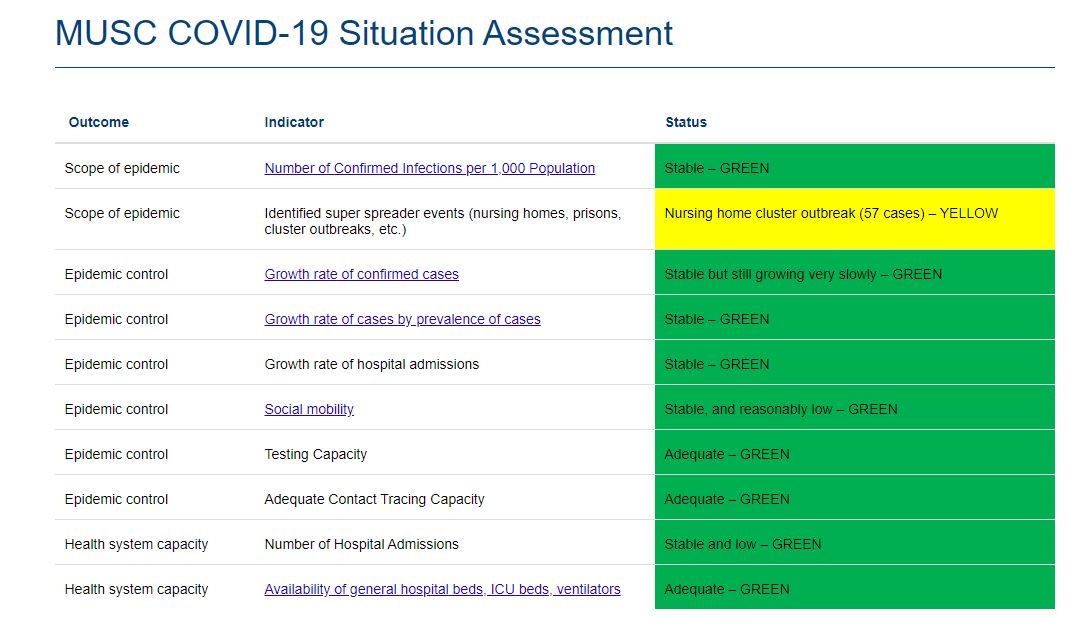CHARLESTON, S.C. (WCBD) – MUSC announced in their Wednesday update that a world-class research team led by world-renowned vitamin D research experts Bruce Hollis, Ph.D., professor emeritus in the Department of Pediatrics, and Carol Wagner, M.D., a professor in the Department of Pediatrics and neonatologist, is investigating the relationship between vitamin D and COVID-19.
The study seeks to determine whether “individuals with sufficient baseline levels of vitamin D have more protection against severe COVID-19 infection.”
According to MUSC, emerging evidence suggests “a potential link between vitamin D deficiency and the pathogenesis of COVID-19 in certain patients.” In other words, low vitamin D levels, common among African Americans and elderly individuals, may lead to “worse clinical outcomes than other groups with normal vitamin D levels.”
MUSC emphasized that they are not “suggesting that vitamin D cures or prevents COVID-19 infection.”

MUSC COVID-19 EPIDEMIOLOGY INTELLIGENCE PROJECT:
The outbreak at the Heartland Health and Rehabilitation Center in Hanahan continues to be a point of concern. Since MUSC’s report was published, the number of reported cases at the facility has grown to 76. Six deaths have been reported at the facility as well.
STATS:
MUSC has completed 9,994 COVID-19 community screening tests, 499 of which produced positive results. This indicates an approximately 4.99% incidence of COVID-19 in those tested.
MUSC currently has six inpatient cases of COVID-19.
MUSC says that inpatient and outpatient cases are no longer being added together for an overall total because that is an inaccurate representation of the data. They cite “fluidity in patient status (i.e., from hospitalization to home isolation or vice versa)” as the variable element.
As of Wednesday, April 15, 41 members of the healthcare workforce tested positive for COVID-19. The number of infected staff remained at 41 for over one week, at which point MUSC said that the number of infected staff “will only be confirmed or provided upon request” because of “the stability of the number over time and the extensive precautions being taken by the system to minimize the risk of exposure.”
MUSC said “it is clear in may cases that our care team members who tested positive…acquired from community and travel transmission. Many of the team members “have fared well and recovered quickly.”
MUSC described the COVID-19 return to work policy as “very conservative.” Members are not allowed to come to work if they are experiencing COVID-19 symptoms, “or if they have not completed the testing process when known to have a high-risk exposure in or outside of work.”
Patients who may have been exposed to a COVID-19 positive staff member are notified according to internal notification and tracing protocols.
SUPPLIES:
MUSC’s supply status is currently still “green,” meaning they are not out of any necessary items at the moment.
In anticipation of a surge in COVID-19 patients, they are centralizing supply distribution and reducing the overall use of personal protective equipment (PPE) where possible. Healthcare providers have been advised to:
- Work expeditiously to transfer non-COVID-19 patients out of airborne infection isolation rooms
- Centralize the supply of all PPE items in a secured area.
- Clearly identify essential personnel who will be caring for any rule out or confirmed COVID-19 patient and limit entry into the patient room to those essential individuals.
- Use face-fitting N95 respirators while in the same room as a rule-out COVID-19 or lab-confirmed COVID-19 patient for most patient care activities (There are some exceptions that are considered safe for care team members.)
- Limit the number of individuals in the room when performing high-risk aerosol generating
- procedures.
- Use face-fitting N95 respirators while in the same room as a rule-out COVID-19 or lab-confirmed COVID-19 patient.
- Not wear face-fitting N95 respirators while in hospital common areas that are not related to patient care activity.
- Use surgical/isolation face masks when experiencing minor respiratory symptoms attributable to non-infectious causes (ex- mild nasal congestion consistent with personal allergic history).
- Care team members may now wear surgical/isolation face masks while in common areas of the hospital.
CAPACITY:
MUSC and the SC State Guard converted an on campus fitness center into a 250-bed field hospital to be used for recovering COVID-19 patients.
MUSC can also use space in the University Hospital Extension and Ashley River Tower for an additional 150 beds. These spaces will be used before the field hospital.
In house testing capacity is “fully mobilized.” Specimens are no longer being sent to DHEC or private labs. MUSC expects a significant reduction in wait times for test results.
DONATIONS REQUESTED: (MUSC Warehouse 4295 Arco Lane Charleston, SC 29418)
- N95 masks
- Surgical masks
- Protective eyewear
- Face guards and face shields
- Sterile gloves
- Hand sanitizer
- Industrial cleaning wipes
- Thermometers (all kinds)
- Hydroxychloroquine
- Azithromycin
- Ethanol
- 200 proof USP-grade alcohol
WORKFORCE ADJUSTMENTS (statewide as of 4/6/20):
As elective surgeries have been put on hold, MUSC has seen significant financial damage. To mitigate the impacts, MUSC announced that they will be re-aligning the workforce “to sustain essential services with compensation reduction and temporary layoffs.”
Every member of the MUSC health team will be impacted: leaders will see a 20% pay-cut and salaried employees will see a 15% pay-cut.
Hourly employees who are not direct patient caregivers will see significantly reduced hours.
MUSC is planning on temporarily laying off around 900 health care team members across the state.
It is important to note that “frontline health care team members who have already seen fewer work hours due to COVID-19 response will not see any additional pay cuts.”










